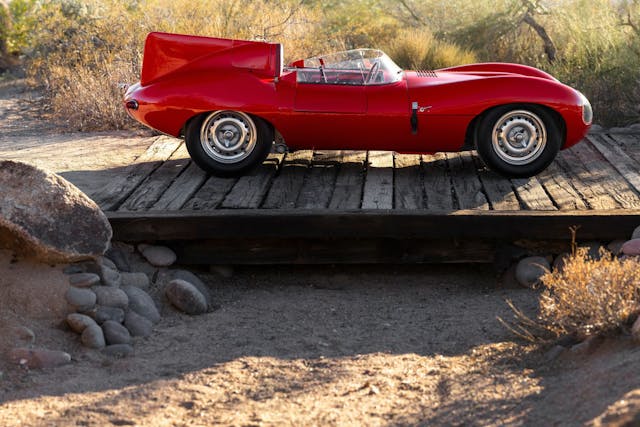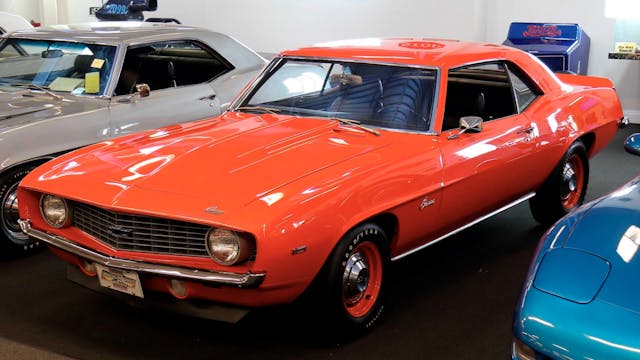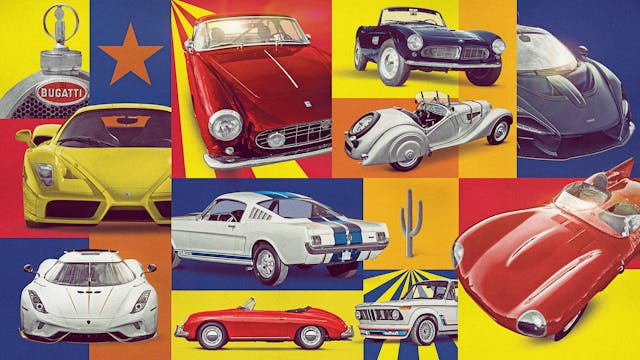Overall, the January auctions confirm what we’d been observing from online auctions and private sales over the last year: the collector car market is looking strong. In recent years, the market had been overcrowded with sellers and auctions, resulting in lower sell-through rates and prices. The turbulence of 2020 seems to have flipped that upside down: Buyers seeking a pandemic-proof pastime outnumber sellers. Whether this is sustainable, and what happens at Barrett-Jackson in March, remains to be seen. What is certain, though—and what may be fueling the surge here—is that the instability in the world won’t affect the horsepower or driving dynamics of a classic car.
The January auctions were smaller this year—and better for it
The 2021 January auctions, like so many other events in the pandemic era, looked very different from normal. But they were, even in condensed form, a testament to demand for classic cars, pulling in $181.9 million in less than three weeks.
Casual auction watchers would be forgiven for believing the January sales were called off entirely; the best-known Scottsdale auction house, Barrett-Jackson, postponed its sale until March, as did Russo and Steele. Last year’s newcomer, Leake, appears to have exited entirely. The big crowds and packed tents we associate with Scottsdale in January were notably absent.
However, several sales pressed on. In Arizona, Bonhams, Gooding & Company, and RM Sotheby’s, all known for offering high-end collectible cars, went on with auctions that relied heavily (in Gooding’s case exclusively) on online participation. Worldwide livestreamed a “Scottsdale” sale from its Auburn, Indiana, headquarters.
Earlier in the month, Mecum Auctions held a large in-person sale in Kissimmee, FL, with mandatory mask wearing for those present and online bidding for those who preferred to watch remotely. A follow-up Mecum sale over the weekend focused on the collection of Muscle Car City, a museum in Punta Gorda, FL.
Of course, these sales couldn’t make up for the haul Barrett-Jackson typically brings. But compared strictly with their counterparts from 2020, the surviving January sales actually showed a near 8 percent uptick in revenue from last year’s $168.4 million. The number of cars offered was down 22 percent from 2020, but average sale price increased 10.2 percent, from $73,698 to $81,234. The increase shows that the combined live-and-online bidding auction format, which through 2020 brought higher sell-through rates than exclusively online or in-person sales, continues to work.
The month kicked off with Mecum’s best-ever Kissimmee sale. Mecum offered 24 percent fewer lots than in 2020, but total sales were 27 percent higher thanks to a sell-through rate that jumped from 64 percent in 2020 to 83 percent in 2021. Average sale price increased 31 percent. This blowout performance likely gave confidence to bidders at RM Sotheby’s and Bonhams sales, which respectively recorded 102 and 112-percent increases in average selling price. Gooding & Company’s average price fell 2 percent, from $293,501 to $287,100.
The higher prices at the Arizona catalog auctions also reflected the fact that there were far fewer cars to bid on. With crowds thin and time scarce, the four catalog auctions provided a select offering compared to previous years, with about half as many lots as 2020.
Even as prices rose overall, we saw signs here that sellers of high-end cars who had been holding out for top-of-market values might finally be adjusting their expectations. RM in particular scored on three repeat consignments from past no-sales. Its most valuable car, a unique red-over-red Jaguar D-Type, sold for $6,000,000 after being bid to $8,850,000 at 2018’s Arizona Auction Week. It was followed by a Bugatti Type 57SC that brought $4,735,000 after failing to sell in March of 2019 with a high bid of $5,700,000. Third was a Ferrari 375 America bringing home $2,557,000, which was a no-sale in August of 2018 with a high bid of $3,250,000.

At Bonhams, a 1959 BMW 507 found a new home when it sold for $1,809,000. It too was a previous no-sale; back in 2015, it was bid to $1.9M. The Jaguar D-Type and BMW 507 in particular suggest consignors of blue-chip cars are more willing to accept the reality that the top of the market has pulled back from dizzying highs of the last decade.
Not all big repeat sales were trending down, though. Mecum sold Carrol Shelby’s personal 427 Cobra for $5,940,000—over 4x more than the $1,375,000 it sold for at RM’s Monterey auction in 2016. Since that sale, the Cobra had been restored (again) and was switched to a manual transmission from the automatic it was originally fitted with.
Overall, the top end of the market was split between older and newer classics. COVID seems to have at once ignited demand for older high-end cars and helped adjust expectations of sellers, many of whom have been waiting for a return to 2014–2015 values. Sell-through rates for 1967 and older cars costing more than $1M was 78 percent, a huge rise from 58 percent last year.
Newer supercars, on the other hand, were left out in the cold this year. Of five offered for more than $1 million, only two—a McLaren Speedtail and a McLaren Senna were sold by RM Sotheby’s for $3,277,500 and $1,044,000—found a new home.
The January auctions were particularly important as a test of the muscle car market. Muscle cars (here defined as those built from 1963 to 1973) are traditionally stars at big auctions, but we haven’t seen many of those since the pandemic began, and online auctions have mostly focused on other segments, such as modern classics.

Just over 500 muscle cars were auctioned this month, down from more than 1,000 last year, while average price increased from $78,000 last year to over $103,000 this year. This suggests that the auction market for muscle cars has contracted some and is focusing on higher-quality cars—and that demand for them vastly outstrips supply. At Mecum’s Muscle Car City auction, the 26 cars that sold at past auctions returned 84 percent over an average term of 12 years, which shows they continue to be a good investment over the long-term.
Segments that were hot going into the pandemic seem to have continued their momentum here. Last year at Scottsdale, we marveled at the prices brought by new Mercedes-Benzes. This year, all six of the 1986–2006 Mercedes-Benzes offered at Scottsdale sold for an average price of $157,000.
The classic Mercedes-Benzes of the early ’70s and older look more like a buyer’s market; sell-through rate of 70 percent for the 10 cars offered lets buyers know they can take their pick of only the best available. Values are strong for the best of the best, though: The average sale price of these long-time classics was more than double that of the newer cars.
Even segments of the market that have been stagnant for some time showed signs of life in January. Worldwide offered a collection of 20 woodies at no reserve and sold them for a total of $1,704,000 with an average selling price of $82,500. The highlight of the night was a 1947 Mercury Series 79M Marmon-Herrington 4×4, which sold for $346,000, 67 percent higher than the 1948 Mercury Series 89M Marmon-Herrington from RM Monterey 2019 ($207,200). Another standout was a 1953 Ford Crestline Country Squire that sold for $85,120, twice the Hagerty #1 value. Collections centered around cult vehicles draw like-minded enthusiasts who start bidding wars.


